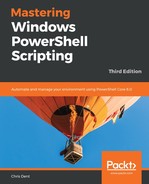A date object can be changed in a number of ways.
A Timespan object can be added to or subtracted from a date:
(Get-Date) + (New-Timespan -Hours 6)
The Date property can be used, representing the start of the day:
(Get-Date).Date
The Add<Interval> methods can be used to add and subtract time, as follows:
(Get-Date).AddDays(1) # One day from now (Get-Date).AddDays(-1) # One day before now
In addition to AddDays, the DateTime object makes the following available:
(Get-Date).AddTicks(1) (Get-Date).AddMilliseconds(1) (Get-Date).AddSeconds(1) (Get-Date).AddMinutes(1) (Get-Date).AddHours(1) (Get-Date).AddMonths(1) (Get-Date).AddYears(1)
By default, dates returned by Get-Date are local (that is, within the context of the current timezone). A date may be converted into UTC as follows:
(Get-Date).ToUniversalTime()
The ToUniversalTime method only changes the date if the Kind property of the date is set to Local or Unspecified. This is shown in the following snippet:
PS> Get-Date | Select-Object DateTime, Kind
DateTime Kind
-------- ----
30 October 2018 18:38:41 Local
The ToLocalTime method adjusts the date in accordance with the system's current timezone. This operation may be performed if Kind is Utc or unspecified.
A date of a specific Kind may be created as follows, enabling appropriate use of ToLocalTime or ToUniversalTime:
$UtcDate = [DateTime]::new((Get-Date).Ticks, 'Utc')
Dates may be converted into a string, either immediately using Get-Date with the Format parameter or using the ToString method. The Format parameter and ToString method accept the same arguments.
The date strings created by the following statements are equal:
Get-Date -Format 'dd/MM/yyyy HH:mm'
(Get-Date).ToString('dd/MM/yyyy HH:mm')
The ToString method is useful, as it means a date can be adjusted by chaining properties and methods before conversion into a string:
(Get-Date).ToUniversalTime().Date.AddDays(-7).ToString('dd/MM/yyyy HH:mm')
When storing dates, it might be good practice to store them in an unambiguous format, such as a universal date-time string. Consider the following:
(Get-Date).ToUniversalTime().ToString('u')
